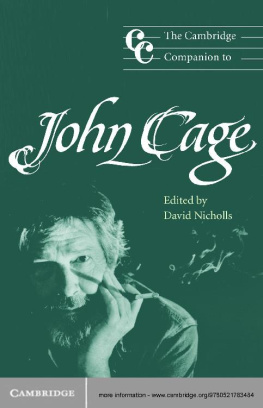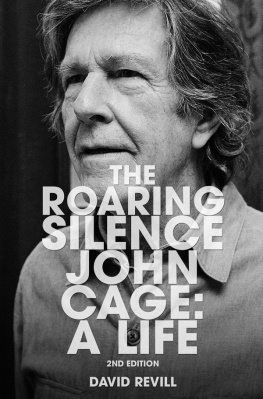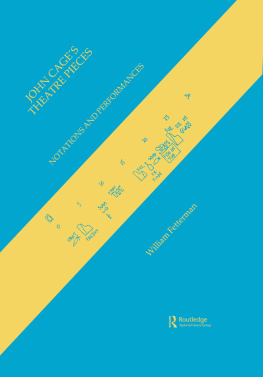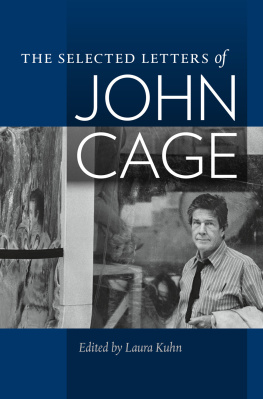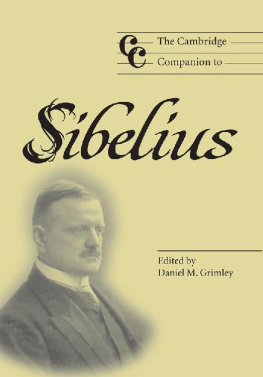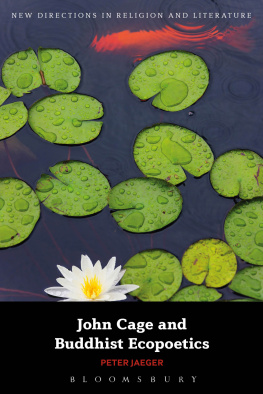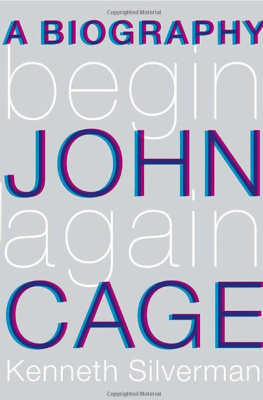David W. Bernstein is Professor of Music at Mills College and head of the music department. His publications and lectures are on Arnold Schoenbergs tonal theories; the history of music theory; John Cage; and Fluxus. He organized a conference/festival entitled Here Comes Everybody: The Music, Poetry, and Art of John Cage which took place at Mills College in November 1995. He coedited (with Christopher Hatch) and contributed to a book of essays stemming from this event entitled Writings through John Cages Music, Poetry, and Art .
William Brooks presently holds faculty positions at the Universities of Illinois and York (England). He has written extensively on various aspects of American music from eighteenth-century music theatre to experimental music of the present. A composer as well as a scholar, he likes to think that each domain informs the other. Future projects include an episodic overview of American music for the University of Illinois Press and an extended work for spatially distributed forces on the poetry of Emily Dickinson.
Kathan Brown is the founder and director of Crown Point Press, an etching workshop that will celebrate its fortieth anniversary in 2002. The Press invites artists to travel to San Francisco to produce etchings in its studio. Browns memoir, ink, paper, metal, wood: Painters and Sculptors at Crown Point Press , was published in 1996, and the following year the National Gallery of Art, Washington, D.C. and the Fine Arts Museums of San Francisco showed the Presss work and published a catalog. Brown lives and works in San Francisco.
Kyle Gann, a composer, has been new-music critic for the Village Voice since 1986 and Assistant Professor of Music at Bard College since 1997. His books include The Music of Conlon Nancarrow (Cambridge University Press), American Music in the 20th Century , and Its Only As Good As It Sounds: Village Voice Articles on American Music after Minimalism . Gann studied composition with Ben Johnston, Morton Feldman, and Peter Gena. His major works include a one-man microtonal opera Custer and Sitting Bull , a ten-movement suite The Planets , and Transcendental Sonnets for chorus and orchestra. CDs of his music are available on the Lovely Music, New Tone, and Monroe Street labels.
John Holzaepfel received his Ph.D. in historical musicology from the City University of New York, where he wrote his dissertation David Tudor and the Performance of American Experimental Music, 19501959. He is currently preparing a biography of David Tudor.
Leta E. Miller, Professor of Music at the University of California, Santa Cruz, is coauthor, with Fredric Lieberman, of Lou Harrison: Composing a World and editor of Lou Harrison: Selected Keyboard and Chamber Music, 19371994 (MUSA, vol. 8). She has written articles on Harrison, Cage, and Henry Cowell; those on Cage appear in Perspectives on American Music, 19001950, John Cage: Music , Philosophy, and Intention, 193350 , and Musical Quarterly . Miller is also an active flutist who has been featured on over a dozen compact disc recordings.
David Nicholls is Professor of Music at the University of Southampton. Author of American Experimental Music, 18901940 (Cambridge University Press) and numerous articles on topics in American music, he has also acted as contributing editor for the reissue of Henry Cowells New Musical Resources (Cambridge University Press), The Whole World of Music: A Henry Cowell Symposium , and The Cambridge History of American Music (Cambridge University Press). He is editor of the journal American Music , and is currently preparing a monograph on Cage for Illinoiss American Composers series.
David W. Patterson is an Assistant Professor of Musicology at the University of Illinois at Urbana-Champaign. His 1996 dissertation on John Cages aesthetic evolution during the 1940s and 1950s received the Sonneck Society Dissertation Prize, and his work since then continues to focus on the work and thought of Cage and the New York School, appearing in American Music, Perspectives of New Music, repercussions , and other journals. Patterson is the contributing editor of John Cage: Music, Philosophy, and Intention, 19331950 .
Christopher Shultis is Regents Professor of Music at the University of New Mexico. In 199394 he was a Fulbright guest professor in American Studies at the Institut fr Anglistik, RWTH Aachen and in 19992000 at the Anglistisches Seminar, Universitt Heidelberg. Shultis has written a book on John Cage Silencing the Sounded Self: John Cage and the American Experimental Tradition as well as several articles. His Cage in Retrospect: A Review Essay ( Journal of Musicology , 1995) won an ASCAP Deems Taylor Award. Shultis is presently an associate editor for Perspectives of New Music .

